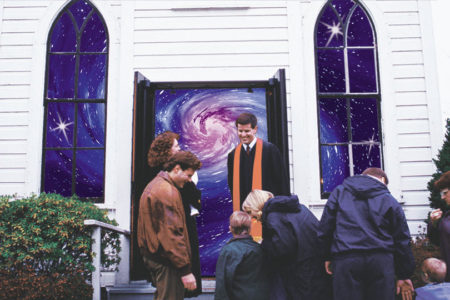The True Message of the Millennium
The topic was the coming millennium and what we can expect to see develop in the future. Panelists on the television show were secular, running in persuasion from moderately conservative to rather radically liberal. A nattily dressed man, representing the views of an ultraliberal think tank, wanted badly to dominate the discussion. Some of his thoughts, while seeming to brush the borders of less-than-sane thinking, contained the germs of what is popularly conceived as ultimate answers to the mess mankind has made of things on this planet.
Two ideas captured my attention. Over the next millennium, he stated rather emphatically, sectarian religions will fade into obscurity. Man will come to realize that dogmatic religion is the great divider of societies and a primary cause of wars, international tensions, and assorted conflicts. There will be a great, barrier-shattering unification that will eliminate all odious vestiges of sectarianism. The other idea was that national distinctions will disintegrate, and the world will settle into one agreeable community—the ultimate form of cordial globalism finally having triumphed. Out of this religious-social-political evolution, something better will emerge. That “something” was never defined. “Better” was a presumption—a presumption based on the belief in the superiority of change.
As I struggled to swim into the mental mainstream of the new revolution, my mind traveled back in time to a rather crude episode in American history. It was the ‘60s, and the campus revolts of the decade were in full swing. This was a time when fractious students were holding college presidents hostage, and some halls of higher learning were being burned to the ground. A reporter asked a shaggy-headed student hooligan involved in torching buildings what it was all about. The answer was that the new revolutionaries were about the business of destroying the system.
“And what do you propose to put in its place?” the reporter asked.
“I don’t know. We’re just going to burn it down and see what comes up out of the ashes.”
More than three decades later, they’re still trying to read the ashes.
Change Is Not Always for the Better
While human beings have always been impressed with change for the sake of change, God is careful to warn against its inevitable dangers. The book of Romans gives us an appropriate example. The subject of the text is the degeneration of God-forsaking political and social systems. The summary text reads:
Who exchanged the truth of God for a lie, and worshiped and served the creature more than the Creator, who is blessed forever (Rom. 1:25).
As countries in the Western world go, the United States is barely out of its infancy. And yet, when we assess the changes taking place that many deem to be “something better,” we find an alarming revelation of how quickly change can deliver potentially devastating results.
Thus some questions. Will the anticipated changes framed for the new millennium be for the better? And what should we actually be focusing attention on as we cross the threshold of the third millennium?
In the presidential debates between Ronald Reagan and Jimmy Carter during their run for the Oval Office, Mr. Reagan, the soon-to-become president, raised a question that captured the attention of voters across the nation.
“Ask yourself,” he said, “if you are any better off today than you were four years ago.”
That’s a good framework for a question as we mark the end of both a century and a millennium: Are we better off than we were, let’s say, a century ago?
One hundred years ago, God still mattered in our educational system. Judeo-Christian ethics and laws regulated public conduct. In fact, there were absolutes that affected the concepts of the culture. A brief century ago, it would have been inconceivable to battle in court or argue acrimoniously against hanging the Ten Commandments on the wall of a courtroom, classroom, or public building. Perhaps the debate over the relevance of those commandments summarizes how far American culture has fallen.
Few can successfully challenge the observation that if one were to choose a comparative period from the annals of ancient Israel to superimpose over this last generation of the millennium, it would be the starkly disturbing final verse of the book of Judges:
In those days there was no king in Israel; every man did that which was right in his own eyes (Jud. 21:25).
Missing the Point
Virtually all the issues-and-answers discussions related to the new millennium are missing the point of the entire phenomenon. For example, the ubiquitous Y2K scare has effectively caused millions to be more concerned about a possible disruptive inconvenience than about where the next thousand years will take mankind. In addition, utopian theories about a near-perfect world devoid of religious squabbling or international strife and warmed by environmental harmony dazzle the minds of “global village” dreamers. When it comes to the matter of dreams of a brave new world, we’ve heard it all before.
I have vivid memories of the 1940 New York World’s Fair. As an impressionable child, I remember sitting wide-eyed in our local cinema at the Saturday afternoon matinee, watching newsreel clips that stunned us with the wonders of the world we were about to enter. Technology was taking us on a ride that even Dorothy and Toto had not experienced on their trip down the yellow brick road to Oz. But alas, all those whirling washing machines, shiny airplanes, and faster-than-a-speeding-bullet trains didn’t get us there. We still have the same old problems.
The True Wonder of the New Millennium
The marvel of the new millennium really took place 2,000 years ago. And, come to think of it, isn’t that what this celebration is supposed to be all about? That revolutionary event is, after all, what we mark our calendars by. A full two thousand years ago, God stepped into time. His was a miracle that does not simply dwarf every man-made gadget, large or small, ever introduced on the planet; it silences the very mention of anything deemed miraculous by human definition.
When Jesus of Nazareth passed from a Jewish virgin’s womb into a manger in Bethlehem of Judea, an eternal era dawned. No turn of any millennium to come could carry appreciable significance after His arrival. All the problems that plague humanity have their solution in Israel’s long-promised Messiah — the Savior of all who will receive Him.
An Answer to the Fall
There is a very simple reason why proposing a faceless merger of all religions and philosophies will never work. Man is inherently an aggressive sinner by nature, choice, and practice. He is totally incapable of creating God-vacant religious systems that actually work. One does not have to waste time arguing this point. God says it in a few words: “For all have sinned, and come short of the glory of God” (Rom. 3:23). History says, “Amen!”
But there in that manger lay a singular solution. “Behold, the virgin shall be with child, and shall bring forth a son, and they shall call his name Immanuel, which, being interpreted, is God with us” (Mt. 1:23). The precise identification and primary mission of this Immanuel was also given: “and thou shalt call his name Jesus; for he shall save his people from their sins” (Mt. 1:21).
Since the problem is sin, the only solution, then, is a Savior. He came in the person of Jesus of Nazareth—Son of man/Son of God.
An Answer to a Safe and Sound World
Artificial destruction of national boundaries will never produce the universal kingdom envisioned by well-intended peacemakers. Many felt this kingdom was just around the corner when the infamous Berlin Wall was sledgehammered to the ground. We have found out differently. Russia’s nuclear missiles are still pointed west, and Russia’s leaders still think and act as men who dream of empires.
There are sadly misguided people on the scene today who are pressing for the United States and Israel to surrender their nuclear weapons. In their view, unilateral disarmament will set a positive example that will shame the rest of the world into becoming congenial members of the civilized, global community. However, we don’t need deep thinkers to make the case for reality. As things stand today, such a move will amount to national suicide.
Why is this true? It has already been stated in an example drawn from another place and another time: “There was [is] no king.” But there is good news—very good news indeed. The King is coming. As a matter of fact, He has been here; and when He left, He promised to come again. There is an old spiritual we hear occasionally this time of year. It is very appealing, I think, because it touches something that speaks about people who, deep in their hearts, long for the King and His kingdom.
“Sweet little Jesus Boy,” the words go, “they made You be born in a manger. Sweet little Holy Child, we didn’t know who You was.”
The sentiment is that we (mankind) missed Him the first time. And if we had only known, we would have done better by Him—a throne instead of a manger. Granted, there are issues to be addressed in such a concept; but the bottom line is that humanity missed Him. And while it was true the first time, it won’t happen again. There is a promise:
Behold, he cometh with clouds, and every eye shall see him, and they also who pierced him; and all kindreds of the earth shall wail because of him (Rev. 1:7).
This verse expresses the climactic event that will bring the King and make His kingdom a reality, just as the promise was given millennia ago.
For unto us a child is born, unto us a son is given, and the government shall be upon his shoulder; and his name shall be called Wonderful, Counselor, The Mighty God, The Everlasting Father, The Prince of Peace. Of the increase of his government and peace there shall be no end, upon the throne of David, and upon his kingdom, to order it, and to establish it with justice and with righteousness from henceforth even forever. The zeal of the Lord of hosts will perform this (Isa. 9:6–7).
Here, then, is the true message of the millennium. It calls upon us to look back as well as ahead. We must respond to the message of the manger, with all its ramifications, and not the mammon-driven projections of “better things” in the world of the new millennium. And for those who do long for a world of true peace with security and justice, look ahead. There is the promise of His coming. And when He does, He will deliver a world in which
They shall not hurt nor destroy in all my holy mountain; for the earth shall be full of the knowledge of the Lord, as the waters cover the sea. And in that day there shall be a root of Jesse, who shall stand for an ensign of the peoples; to him shall the nations seek, and his rest shall be glorious (Isa. 11:9–10).
Such is the wonder of the ages, not just a millennium. After all, in God’s eye, a thousand years is like a fleeting day. Therefore, at this memorable juncture in our journey, may we see eternal prospects and respond with appropriate grace and determination.







